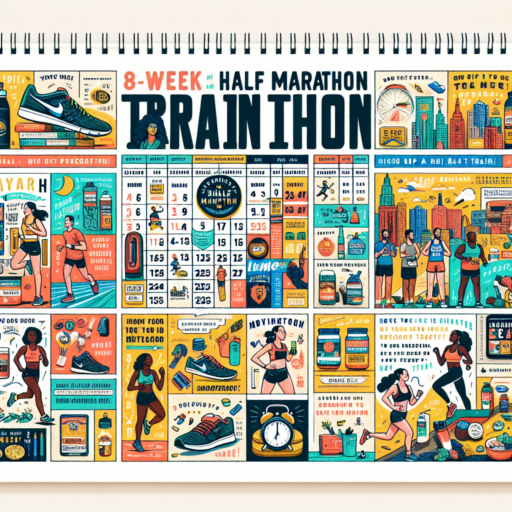Can I train 8 weeks for a half marathon?
Embarking on the journey to run a half marathon is an exciting challenge that requires dedication, planning, and the right training regime. While traditional training programs for a half marathon often suggest a 12-week preparation period, many wonder if it’s possible to shorten this time frame. Specifically, the question arises: Can I train 8 weeks for a half marathon? The answer is nuanced and largely depends on your base fitness level, running experience, and personal goals.
First and foremost, it’s important to assess your current running capabilities. If you’re already comfortable running shorter distances, say 5K or 10K, your body has a foundation of endurance. This foundation is crucial as it means your body is somewhat adapted to the rigors of running. For beginners, or those with limited running experience, jumping straight into an 8-week half marathon training plan could be challenging and potentially risky in terms of injury.
Designing a training plan for an 8-week preparation involves careful consideration of several factors. The plan should include varied workouts such as long runs, speed work, and recovery days to ensure you’re building endurance while preventing burnout and injury. Here’s a basic framework you might consider:
- Weeks 1-2: Focus on building a base by gradually increasing your mileage.
- Weeks 3-4: Introduce speed work like intervals or tempo runs to boost your cardiovascular fitness.
- Weeks 5-6: Increase your long run distances, pushing towards the half marathon length, while continuing with speed and recovery work.
- Weeks 7-8: Start to taper, reducing your mileage to ensure your body is rested and ready for race day.
Ultimately, while training for a half marathon in 8 weeks is possible, it demands a significant commitment to your training plan and a focus on listening to your body to avoid overtraining. It’s also advisable to consult with a running coach or professional to tailor the plan to your specific needs and ensure you’re preparing in a safe and effective manner.
Can I run a 5k in 8 weeks?
Absolutely, preparing for a 5k run in 8 weeks is a realistic goal for many beginners and those looking to get back into fitness. With the right training plan, motivation, and dedication, you can cross that 5k finish line successfully. The key is to start gradually, allowing your body to adjust to the new levels of physical activity without overwhelming it.
Firstly, it’s essential to create a structured running plan that includes incrementally longer runs, rest days to prevent injury, and cross-training to improve your overall fitness. Integrating a mix of running, walking, and resting will help build your endurance steadily without causing burnout or injury. Many 5k training plans for beginners are designed around this principle, ensuring a balance between pushing your limits and adequate recovery.
Another pivotal element is tracking your progress. Using a running app or a journal to note down distances, times, and how you felt during each run can be incredibly motivating. Seeing your progress over the weeks not only boosts your morale but also helps in adjusting your training plan if needed, making your 5k goal more attainable.
It’s also worth noting that diet and hydration play a significant role in your training. Fueling your body with the right nutrients and keeping hydrated will improve your performance and recovery times. Focus on balanced meals rich in carbohydrates, proteins, and healthy fats, along with ensuring you’re drinking enough water before, during, and after your runs.
How to run 21km in 2 hours?
Running 21km, or a half marathon, in under 2 hours is a significant achievement that showcases endurance, speed, and mental toughness. Achieving this goal requires a structured training plan, the right nutrition, and a positive mindset. To embark on this journey, it’s essential to understand the basics of pacing, recovery, and race-day strategies.
Optimizing Your Training Regimen
Effective training is the cornerstone of running a half marathon in less than 2 hours. A mix of long runs, speed work, and tempo runs helps build the stamina and speed necessary for this challenge. Incorporating strength training and flexibility exercises into your routine also reduces the risk of injury and enhances performance. It’s crucial to gradually increase your mileage, allowing your body to adapt without overtraining.
Nutritional Strategies for Peak Performance
The role of nutrition cannot be overstated when preparing for a 21km run. Focusing on a balanced diet rich in carbohydrates, proteins, and healthy fats ensures your body has the fuel it needs. Hydration is equally important; maintaining an optimal hydration level before, during, and after your runs will significantly impact your training and recovery. Consuming energy gels or drinks during the run can also help maintain your energy levels and improve your overall time.
No se han encontrado productos.
How many months should you start training for a half marathon?
Deciding on the right time to start training for a half marathon can be crucial to your success and overall experience. For most beginners, the recommended preparation time is around 12 to 14 weeks. This period allows for a gradual increment in mileage, helping your body adapt to the physical demands of long-distance running without increasing the risk of injury.
If you already have a solid running base or have completed shorter races previously, you might be able to shorten your training period. Experienced runners often opt for an 8 to 10-week training schedule. This timeframe still provides sufficient opportunity to build endurance and improve running economy, essential components for completing a half marathon with a desired time goal.
However, it’s not just about logging miles. Integrating strength training, rest days, and proper nutrition are also pivotal aspects of a successful half marathon training plan. Recognizing and listening to your body’s signals is paramount. If injuries or unexpected life events occur, being flexible and adjusting your training schedule accordingly can help maintain progress without overextending yourself.




